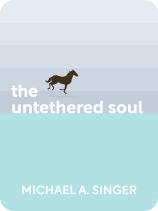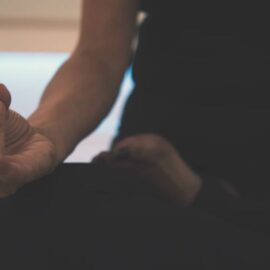

This article is an excerpt from the Shortform book guide to "The Untethered Soul" by Michael A. Singer. Shortform has the world's best summaries and analyses of books you should be reading.
Like this article? Sign up for a free trial here .
What is The Untethered Soul book about? What keeps most people from realizing their true self, according to its author Michael Alan Singer?
In his book The Untethered Soul, Michael Singer invites you on the journey beyond yourself and towards your true Self. He believes that the main reason people feel existentially empty and fragmented is that they are overidentified with their internal monologue and disconnected from their true Self.
Here is a brief overview of Michael A. Singer’s book The Unterthered Soul: The Journey Beyond Yourself.
The Untethered Soul: Book Premise
In his book The Untethered Soul, spiritual teacher Michael A. Singer, founder of the Temple of the Universe meditation center and a pioneering figure in the world of medical software, teaches you how to use your direct self-knowledge as an intuitive tool for awakening to your true identity.
According to Singer, most people lead unhappy and unfulfilling lives because they are overidentified with their internal monologue and disconnected from their true selves—the awareness behind this voice. In his book The Untethered Soul, he offers a series of metaphors to illustrate his teachings in a more accessible way:
The Metaphor of the Lucid Dream
Your daily life is like sleepwalking. You’re essentially lost in a dream: When you focus your consciousness intensely on an object, you lose your sense of self-awareness in it. This happens not just with physical objects but with mental objects (thoughts and emotions), which are often caused by outer events. It’s like being immersed in an all-encompassing movie where your thoughts and emotions move in synchronization with your sensory experiences.
The phenomenon of lucid dreaming, where you become aware that you’re in a dream, offers a useful analogy for spiritual awakening from this state of unconsciousness. You wake up in the dream of your life by learning to turn awareness back on itself. It’s like being lost in a movie for hours and then suddenly “coming to yourself” and remembering that you’re watching a fictional melodrama on a screen. You realize that the person you’ve always thought of as yourself is really just a movie titled [Insert Your Name]. Asking the master question “Who am I?” is one way to practice this discipline of self-awareness.
The Metaphor of the Inner Thorn
For true spiritual growth, you must come to peace with pain, because you’ve built your whole life on it. Imagine your pain as a thorn. It’s embedded in your arm, right on a nerve. Should you respond by removing the thorn or by making sure that nothing touches it? If you decide on the second option, protecting your pain will consume your life: You’ll build a thorn-shaped life as your daily actions revolve around shielding the painful spot.
Fortunately, you can extract your inner thorn. Use the events and encounters of your daily life as opportunities for doing this. Pay attention to your emotions, mood, and relative sense of happiness and security. When you feel a disturbance, release the initial pain right away to avoid being trapped in the long term. Learn that it’s okay to feel inner disturbances because they don’t disturb the seat of your consciousness.
The very core of spiritual work is to become comfortable and free by letting pain pass through you. If you do this, you’ll learn that in addition to stored-up pain, you also have joy, beauty, love, peace, freedom, and ecstasy inside you. They’re on the other side of the pain. You have to go through it to find them.
The Metaphor of Inner Addiction
One way to describe your current relationship to your psyche is that you’re addicted to it. You mistakenly think your psyche protects you from pain, so you’ve devoted your life to meeting its constant demands. But in fact, your psyche is pain. It’s your crazy inner roommate. Realize that your psyche is very ill, as you know from your frequent feelings of mental and emotional disturbance.
The good news is that you can break the addiction: Wake up and realize that the trouble is in you, not the world. You can’t solve your inner problems by rearranging the outer world and getting better at external games, because external changes don’t address the root of your inner problem. Learn to notice when your mind is trying to “make everything okay,” and gently let go of this. Eventually, your practice of disciplined awareness will lead to a persistently centered consciousness. Once you’re free from your psyche’s demands, you can wake up and face each day like a vacation.
The Metaphor of the Inner Prison
To discover the infinite reality beyond your psyche, recognize that your psyche is like a fortress or cage that you built for yourself long ago. You’ve lived in this prison for so long that you’ve mistaken it for the whole universe. You built it from thoughts and emotions, and ultimately from your self-concept, and then you turned it into a fortress. Now, you bump up against its invisible walls whenever you bump up against anything that threatens the comfort zone of your self-concept. Ultimately, you’re an infinite being, so you hit your prison walls whenever you place any finite limit on yourself.
Most people devote their lives to constantly building, rebuilding, and maintaining their prisons. In other words, they live in constant resistance to life. This attempt to “hold everything together” through clinging is a form of suffering. The very idea that you can cling is ultimately an illusion, because life inevitably flows and changes.
People who experience real spiritual awakenings wake up to the fact that they have imprisoned themselves. Instead of viewing your walls as protecting you from infinite darkness, see them as barriers that block out a beautiful, infinite light. Recognize the moments when your mental model of the world starts to crumble through inner turmoil as blessings, not threats. Let your prison collapse. Eventually, the turmoil will stop, and you’ll rest in total, blessed stillness.
Once you’re liberated, you’ll still have a self-concept and thoughts and emotions, but they’ll be just one small part of your total being. You won’t identify with them. Your only identity will be your sense of Self. Then you’ll never have to worry about anything again. You will have aligned yourself with the forces of creation, and you’ll be at rest in the infinitude of your true Being.
The Return to God
The ultimate goal of Michael Singer’s teachings in his book The Untethered Soul is to return to God. The real knowledge of God only comes from personal experience. You can only know God accurately from the absolute, omniscient, omnipresent, omnipotent center of Being itself—that is, from God’s own perspective.
Fortunately, you have a direct inner connection that gives you access to God’s perspective. You use this connection by employing the lessons outlined in The Untethered Soul book. Through continued practice of these things, an experience of divine union emerges. The veils of your human mind and heart can fall away to reveal the infinite, ineffable joy beyond the finite walls of your psyche.
The full summary of Michael Singer’s book The Untethered Soul: The Journey Beyond Yourself is available here.

———End of Preview———
Like what you just read? Read the rest of the world's best book summary and analysis of Michael A. Singer's "The Untethered Soul" at Shortform .
Here's what you'll find in our full The Untethered Soul summary :
- How to find your true self instead of your false identities
- Why getting lost in the moment is important
- Why death is the greatest spiritual teacher about life






